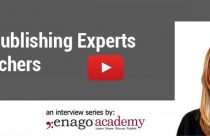Who are Journal Editors?: An Interview With Stephanie Kinnan (Part 2)

 In the second part of this interview series, Stephanie highlights the expectations that journals have for the articles that are sent to them for publication. Stephanie also shares some insights into the latest trends in academic publishing and how VideoGIE, an online-only, open access journal publishes original, peer-reviewed video case reports and case series of endoscopic procedures used in the study, diagnosis, and treatment of digestive diseases. She also discusses how her involvement at ISMTE has helped in the growth of her career and how forums such as COPE help her remain updated on the various developments in academic publishing.
In the second part of this interview series, Stephanie highlights the expectations that journals have for the articles that are sent to them for publication. Stephanie also shares some insights into the latest trends in academic publishing and how VideoGIE, an online-only, open access journal publishes original, peer-reviewed video case reports and case series of endoscopic procedures used in the study, diagnosis, and treatment of digestive diseases. She also discusses how her involvement at ISMTE has helped in the growth of her career and how forums such as COPE help her remain updated on the various developments in academic publishing.
Kuntan: I have seen that different journals have different formats in which they communicate the result of a review and whether the submission is accepted or rejected. Some use a detailed checklist format and others just write a paragraph of explanation. In your case, how do you communicate information about a rejection? And do you suggest any kinds of resources to the authors?
Stephanie: We actually do have a checklist for our reviewers. We have a GIE reviewer guide that our reviewers can refer to so that they know what to look for and what kinds of comments the authors are expecting to receive. We encourage them to go through the manuscripts thoroughly, pointing out any constructive criticisms that they may have. Their goal is to help the authors improve their paper. If it does happen to be rejected, the letter will not say “this paper was rejected because of this, this, and this”; instead it will be “these are some concerns we had and ways in which you might improve it.”
Kuntan: Is GIE the only journal produced by the American Society for Gastrointestinal Endoscopy (ASGE)?
Stephanie: Actually, we just started a new journal. It launched this summer and is called Video GIE. It is a completely video-based, online, open access journal. Endoscopy is a very visual field, so we found that our readers really love the fact that we are including videos in GIE. As a result, this new undertaking seemed to make sense. There has been a lot of buzz about the launching of our second journal. We also have video abstracts. You will have a short abstract describing a video case, and then the case will be presented solely in video form. We are seeing more and more users who want to search something online and see an image or video as opposed to picking up a physical copy of the journal and just sitting there and reading it. We have especially noticed with a lot of our younger members that this was a really popular medium, which is also why we have gotten into things like social media and podcasts. We are really trying to keep up with what our readers are interested in and with the trends in the world of publishing.
Kuntan: Are there recent trends in the industry that have helped you in your editorial process or that you think have improved the quality of the editorial process?
Stephanie: I definitely have to say that the crosscheck report we now use has been huge. I think lots of journals are now using tools like that because this has been such a problem for many journals. It is a great way to educate international authors on things that we expect and ethical concerns that we may have. As I mentioned before, our concern is text duplication, which is not necessarily just using work from other authors but from even one’s own work, i.e., self-plagiarism. If you take work that you have published in the past and reuse it, you need to make sure that the content is different. These reports have been so helpful to members of our field.
Kuntan: You have a background in English writing and now you are here working with a medical journal and looking at papers submitted for publication. How did this transition happen?
Stephanie: I think that journal editing and publishing was always a natural option for me. I have always enjoyed editing work. In college, I did a little bit of tutoring and editing and then transitioned to some contract work in editing after I graduated with a major in English writing. This was a good fit and a natural transition for me. I found scientific publications and technical editing to be a great opportunity. I was looking for something in the publishing or editorial field, and I came across ASGE. They were looking for an editorial assistant, and the description of the position was exactly what I had been looking for. I think that working for a scientific or medical journal gives you a rare opportunity to feel as if you are making a difference. Although working as an editor and not as a doctor, you are perhaps not making the kind of difference that the doctors are, but you are publishing quality work, articles, and content that will really help people and someone that is going to read and learn from. That is certainly something that attracted to me to ASGE and to the field in general.
Kuntan: As an early-career professional, what resources or tools do you use often to keep yourself up to date with current happenings in the industry?
Stephanie: Ethics and publishing are a huge deal, so the Committee on Publication Ethics has been a great tool for learning the details of ethics and publishing. The International Society of Managing and Technical Editors (ISMTE), of which I have been a member for about a year and a half now, has been a fantastic resource, because it allows me to connect with other members of the field. This gives me an opportunity to see new trends and innovations in the field, and also to see what other journals are doing that we could potentially be doing.
Kuntan: Is there someone who has played a major role or been a great mentor in your career so far? People always say that when you are taking your first job, the important thing is not so much which company you choose as having a good boss, because that is where you will usually learn. Can you share any personal experiences of how your first two years have been?
Stephanie: Yes. I have a fantastic boss, Deborah Bowman, who is the Senior Managing Editor of Clinical Publications for ASGE. She has been a wonderful guide through this whole publishing world. I have definitely learned a lot from her during my time at ASGE, and I think that together we have done a lot of new and innovative things with the journal and pushed the boundaries of what people expect from a scientific journal.
Kuntan: Do you have any advice for people who are interested in getting into the STM industry as a career or for other early-career professionals?
Stephanie: Just learn as much as you can about the field and do your research. As I have mentioned before, ethics and publishing is a big thing to be familiar with. Stay updated on new technology, new trends, and what the next thing is going to be in the field, so that you have something to bring to the table when you do get that first position.
I would say it is good to pick a general area that you have an interest in. If you have a math or scientific background, you might want to gravitate more to a journal or a publication that relates to that field, but just read all you can, to make sure that you are up to date on anything going on in that field. For example, if you work for a medical journal, it would be great to take a medical editing class, or maybe read online about some of the new innovations taking place in the medical field that you are interested in. Also, be sure to develop an eye for detail. That is always important if you are going to go into scholarly publishing.
(This interview is a part of our interview series of connecting scholarly publishing experts and researchers.)





